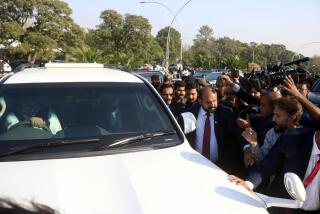Supporters rejoice as Pakistan chief justice quietly resumes duties
Reporting from Islamabad, Pakistan — Chief Justice Iftikhar Mohammed Chaudhry, who became a symbol of resistance to military rule in Pakistan, quietly resumed his duties Sunday after an incendiary two-year political confrontation that brought down one government and threatened another.
In a sometimes tearful ending to the saga, supporters of the reinstated jurist raised the Pakistani flag at his residence, in keeping with a vow made by former Prime Minister Benazir Bhutto before her assassination 15 months ago.
Chaudhry’s suspension in March 2007 by then-President Pervez Musharraf sparked the creation of a nationwide pro-democracy movement that was originally spearheaded by lawyers but came to encompass a broad swath of civil society. The chief justice’s backers described efforts to reinstate him as part of a larger struggle for an independent judiciary and the rule of law in nuclear-armed Pakistan, which is beset by a virulent Islamic insurgency and is the presumed haven of Al Qaeda leader Osama bin Laden.
Amid a joyful beating of drums, lawyers and their supporters converged Sunday on the walled yard of Chaudhry’s Islamabad residence, where the chief justice spent five months under house arrest during 2007 and 2008.
“This is a truly important day for the people of Pakistan,” said Aitzaz Ahsan, the internationally known barrister who championed Chaudhry’s cause. Some in the crowd wept as the Pakistani flag was hoisted by supporters including Israr Shah, a parliamentarian who lost both legs in a 2007 bombing that targeted a lawyers’ gathering.
The lawyers’ movement played a pivotal role in forcing Musharraf to give up his role as army chief, and later in dislodging him from the presidency. A civilian government took office a year ago, but split over Chaudhry’s reinstatement.
On March 16, with a huge protest march led by lawyers and opposition leader Nawaz Sharif advancing on the capital, the government of President Asif Ali Zardari gave in. The president’s resistance to reinstating Chaudhry was widely believed to stem from his fear that the chief justice would revive old corruption charges against him.
Chaudhry did not take part in Sunday’s celebrations, in keeping with what aides described as his wish to remain nonpolitical. But his symbolic role in the pro-democracy struggle could prevent him from taking part in some highly sensitive cases, including those reviewing an amnesty for Zardari and others accused of corruption, Sharif’s recent disqualification from holding elective office, and the high court’s earlier decision upholding Musharraf’s declaration of emergency rule in late 2007.
The gathering represented a not-so-subtle effort on the part of some leaders of Bhutto’s Pakistan People’s Party to claim credit for Chaudhry’s reinstatement, even though Zardari -- Bhutto’s widower and successor as party leader -- had impeded his return.
Pakistan’s latest turmoil caused considerable concern within the Obama administration, which feared that a power struggle could divert the Pakistani government’s attention from the confrontation with Islamic militants.
Chaudhry’s reinstatement resolved the immediate crisis, but the struggle weakened Zardari and raised the possibility of an eventual split in his ruling party. It also underscored the growing strength of Sharif, a former prime minister who is now considered the country’s most popular politician.
Because of a national holiday today, the Supreme Court will not be in session until Tuesday. But the court said in a news release Sunday that Chaudhry had resumed work, including tasks such as impaneling other judges and approving dates for hearings.
More to Read
Sign up for Essential California
The most important California stories and recommendations in your inbox every morning.
You may occasionally receive promotional content from the Los Angeles Times.








